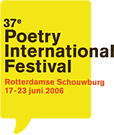Poet
|
Gerrit Kouwenaar 1923 country: Netherlands Nederlands |
wordt gerekend tot de belangrijkste Nederlandse dichters van na de Tweede Wereldoorlog. Zijn oeuvre beslaat naast bijna achthonderd pagina's gedichten ook romans en toneelvertalingen. Kenmerkend voor Kouwenaars poëzie is dat zijn gedichten zich nadrukkelijk presenteren als 'dingen van taal'. Zijn poëzie is gemaakt van woorden, niet van gedachten of gevoelens. Voor zijn gedichten ontving hij behalve alle belangrijke Nederlandse prijzen ook de driejaarlijkse Vlaamse Prijs der Nederlandse Letteren. Voor zijn vertalingen werd hij onderscheiden met de Martinus Nijhoffprijs. In 2008 verscheen zijn laatste bundel, Vallende stilte: een keuze uit eigen werk.
Kouwenaar produced his first wholly personal poetry during the 'Cobra' period as a member of the Experimentele Groep Holland, which included the painters Constant Nieuwenhuis, Karel Appel, Corneille, and Lucebert (who is a poet in his own right). His first 'experimental' book of poetry, Achter een woord (Behind a Word) appeared in 1953. He earned his living as a reviewer and a translator of plays (by Brecht, Hochhuth, Goethe, Schiller, Rostand, Weiss, Carlino, Taylor, Sartre, and Dürrenmatt). After his experimental period, his poetry tended toward the hermetic: De stem op de 3e etage (The Voice on the 4th Floor, 1961). From that point on he has managed to keep expressing complex meanings in ever simpler lines. His most recent book, Een geur van verbrande veren (A Smell of Burnt Feathers, 1991) has been acclaimed as a miracle of simultaneous complexity and clarity. The poet does not allow himself time to look up at the heavens, because 'the flesh needs to be written'. Unlike the heavens, the flesh has an expiry date - its shelf life is limited. The flesh lives its life passionately and to the full, as it lives in decay. The poet senses in everything he sees, or remembers in images, in all life's manifestations the urgent ticking of a delicate mechanism. He registers each tick as 'the moment when', as meticulously as the watchmaker does. Yet he fears his labour to be a Sisyphian one, because even 'as the dragonfly, its ink still wet / unfurls its characters on the hammer poised for the blow', the dragonfly is already past knowing whether it's alive - 'as the present resumes its stagnancy'. Kouwenaar is a poet who has developed his own unique idiom, an 'intermediate language' to materialize life - the tense immobility of motion, the impenetrable darkness of clarity, the ear-shattering silence between ticks - in language. In 'a manner still of speaking' - that is. is among the Netherlands’ most influential poets of the post-war era. In over fifty years as a practicing poet he has developed a strongly individual verse technique and imagery which deeply affect the reader. He has received many awards for his poetry, including the prestigious VSB Poetry Prize. Gerrit Kouwenaar (Netherlands, 1923) who celebrates his eightieth birthday this year, is rated among the most influential Dutch poets of the post-war era. His outstanding position in Dutch letters has earned him numerous awards, including the most prestigious prizes the Netherlands can bestow on its poets: the VSB Poetry Prize and the PC Hooft Prize. To do him and his work justice in a brief introduction like this is well-nigh impossible; his oeuvre by now comprises close to eight hundred pages of poetry (most of it collected in two volumes), three novels, and a vast number of translations, mostly for the stage. He has been the subject of many dissertations, of monographies and film documentaries, he has set out his views on poetry in countless interviews – he has, one might say, gathered a following. It is indeed no exaggeration to say that the poetic landscape in the Netherlands would have been different without his work. A main characteristic of Kouwenaar’s influential poems is that they emphatically manifest themselves as ‘things made of language’. Poetry is made of words, not thoughts, or feelings, or whatever else. Notwithstanding this principle, his poems are often capable of stirring extremely deep emotions in the reader through the mere action of language and words, as demonstrated in his latest collection totaal witte kamer (Totally White Room), which is, in part, a requiem for his late wife. Kouwenaar’s intensive use of what could be termed the entire ‘field of meaning’ of words and expressions causes his poems to approach as closely as possible the almost ‘bodily reality’, or what he himself likes to call ‘the flesh’. In Kouwenaar’s verse, the flesh is made word. In addition to this, Kouwenaar’s linguistic investigations of what is the passage of time and what are its effects, are without parallel. In the language of the poem the transient and ephemeral is made present and fixed in time, and is thereby preserved. Kouwenaar: ‘All art revolves around a few simple themes: love, death, injustice, beauty. You try to make something which will stand the test of time. Nothing is present forever. A good work of art is snatched from time, has outwitted merciless time.’ In Kouwenaar’s poems it is ‘as today as always’. And so it will be for a long time to come. Author: Erik Menkveld Translated by Ko Kooman Gedichten 1948 - 1978 (1982); Een eter in het najaar (1991); helder maar grijzer. Gedichten 1978 – 1996 (1998); een glas om te breken (1998); totaal witte kamer (2002). Poets: |


